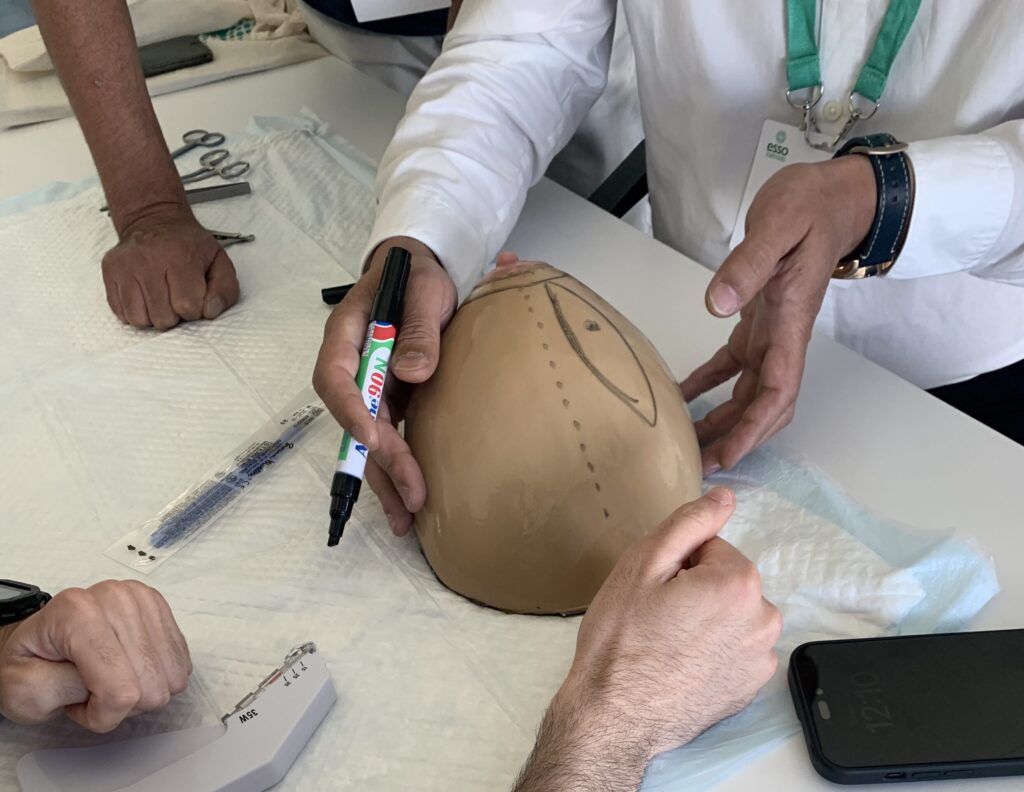
Breast Cancer
The ESSO Training Pathway in Breast Cancer Surgery, developed in cooperation with BRESO, is designed to equip surgeons with advanced, evidence-based skills and practices in breast cancer surgery, including oncoplastic techniques, robotic surgery, and localisation methods.
What's included
In addition to the mandatory and optional courses, the pathway includes a short observership and culminates with the awarding of an ESSO Certificate of Competence, with the option to take the recommended EBSQ examination. Designed to recognise your expertise and commitment to evidence-based breast cancer surgery, it’s the ultimate step toward excellence in breast surgery.
Candidates wishing to further extend their expertise may join the BRESO certification programme, which leads to the title of BRESO Fellow.
Related courses
Basics of Oncology for Surgeons
Level 1
Mandatory
Annual
In person
This interactive in-person programme equips young surgeons with core knowledge and skills in surgical oncology. Organised once per year, this course provides a solid foundation in cancer biology, prevention, surgical techniques, and the role of the surgical oncologist within a multidisciplinary team. Through plenary lectures and discussion sessions, participants will explore cancer progression, early diagnosis, multimodal treatment strategies, and ethical, patient-centred care. The course also emphasises cancer screening and prevention, with reference to the Europe's Beating Cancer Plan.
Breast Cancer Surgery
Level 2
Mandatory
Annual
In person
This advanced interactive workshop explores the latest evidence-based practices in breast cancer surgery, emphasising a multidisciplinary approach. Educational methods include hands-on training with synthetic models, video discussions, case studies, mock MDT sessions, and plenary lectures. Key topics cover advanced surgical techniques such as nipple- and skin-sparing mastectomy, axillary management, breast reconstruction, adjuvant and neoadjuvant therapies, breast conservation, DCIS, and treatment of young and special patient groups.
USD and Localisation Techniques in Breast Cancer Surgery
Level 2
Mandatory
Annual
In person
Organised yearly, this course equips participants with both foundational and advanced knowledge of ultrasound techniques in breast cancer surgery, focusing on the use of intraoperative ultrasound (IOUS) in clinical and outpatient settings. Through a combination of theoretical lectures, hands-on training with phantom models, live demonstrations, and case-based discussions, participants will learn to perform ultrasound-guided procedures, apply alternative localisation techniques, and assess margins with greater precision. The course aims to build confidence and surgical accuracy, ultimately enhancing patient outcomes in breast surgery.
Minimally Invasive Breast Surgery (MIBS) Masterclass and Workshop
Level 2
Mandatory
Annual
In person
This masterclass is organised every year and it covers state-of-the-art minimally invasive breast surgery, focusing on robotic and endoscopic nipple-sparing mastectomies with immediate reconstruction. It addresses indications, patient selection, technical aspects - including live surgery, console techniques, and robotic setup - as well as complication prevention and management. The course also reviews research, outcomes, benefits, and cost efficiency through lectures, video presentations, live demonstrations, surgeries, and hands-on workshops.
Artificial Intelligence in Healthcare
Level 1
Optional
Annual
In person
Artificial Intelligence (AI) is transforming healthcare, offering tools that enhance both clinical efficiency and patient care. In this hands-on workshop which is organised once per year, interested surgeons and radiologists will explore how AI works, learn to train models for real-world applications, and apply their medical expertise to develop practical solutions using clinical data, images, and reports.
This workshop offers a hands-on introduction to AI in medicine, covering model types, tasks, real-world use cases, and the role of clinical expertise. Participants will use Python tools to work with public datasets, analyse medical images, and create 3D organ models for surgical planning. The course includes plenary lectures and practical exercises.
Fluorescence-Guided Surgery
Level 1
Optional
Biennial
In person
Organised once every 2 years, this course offers essential and advanced insights into fluorescence-guided surgery. It is focusing on tumour and lymphatic imaging, sentinel lymph node detection, visualisation of vital structures (bile ducts, ureters, nerves), and tissue perfusion assessment. Participants will explore both standard and targeted imaging agents (e.g., antibody-, peptide-, nanobody-based) and gain practical experience in open, laparoscopic, and robotic settings.
Hands-on sessions using different fluorophores and imaging systems are complemented by plenary lectures on key topics, including lymphatic and tumour imaging, perfusion assessment, and intraoperative navigation of vital structures.
Related webinars
To complement your knowledge gained through the Training Pathway courses, ESSO recommends following optional webinars covering both specialty-specific and transversal topics. These webinars provide in-depth insights, may include interactive case discussions, and are designed to enhance clinical understanding and support continuous professional development.
Short-term observership
To enhance their training, participants in the Breast Cancer Training Pathway are invited to independently arrange a short-term observership at one of the European Breast Surgical Oncology Certification (BRESO)-approved breast units. Lasting 1 to 3 months, this self-organised observership can include access to operating theatres, outpatient consultations, MDT meetings, and research activities. Participants are advised to incorporate tailored learning experiences such as role plays and hands-on practice with phantoms. Direct clinical involvement is not anticipated.
EBSQ examination recommendation
Each year, the European Union of Medical Specialists (UEMS) organises the European Board of Surgery Qualification (EBSQ) Examination in Breast Surgery. As part of the ESSO Breast Cancer Training Pathway, participants are advised to take this exam to complete their Training Pathway.